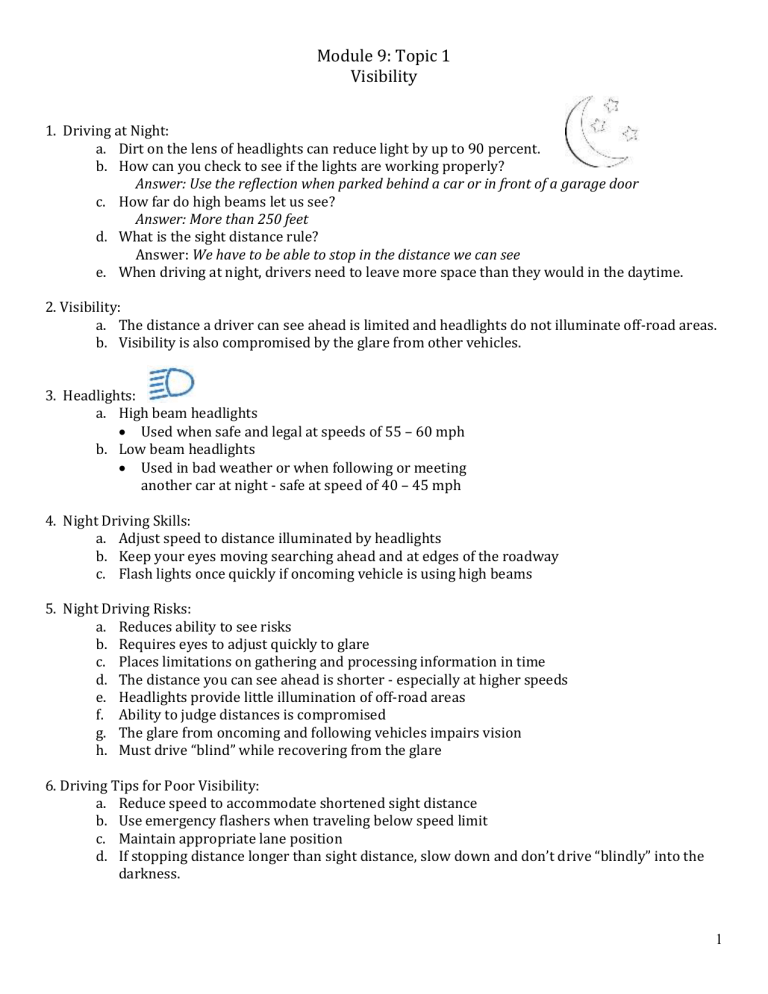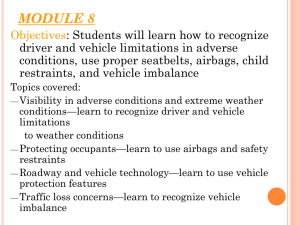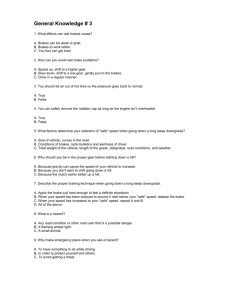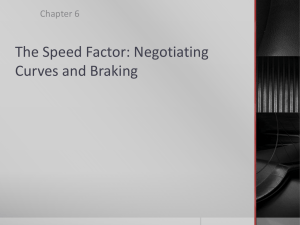Driving Safety: Visibility, Weather, and Vehicle Technology

Module 9: Topic 1
Visibility
1. Driving at Night: a.
Dirt on the lens of headlights can reduce light by up to 90 percent. b.
How can you check to see if the lights are working properly?
Answer: Use the reflection when parked behind a car or in front of a garage door c.
How far do high beams let us see?
Answer: More than 250 feet d.
What is the sight distance rule?
Answer: We have to be able to stop in the distance we can see e.
When driving at night, drivers need to leave more space than they would in the daytime.
2. Visibility: a.
The distance a driver can see ahead is limited and headlights do not illuminate off-road areas. b.
Visibility is also compromised by the glare from other vehicles.
3. Headlights: a.
High beam headlights
Used when safe and legal at speeds of 55 – 60 mph b.
Low beam headlights
Used in bad weather or when following or meeting another car at night - safe at speed of 40 – 45 mph
4. Night Driving Skills: a.
Adjust speed to distance illuminated by headlights b.
Keep your eyes moving searching ahead and at edges of the roadway c.
Flash lights once quickly if oncoming vehicle is using high beams
5. Night Driving Risks: a.
Reduces ability to see risks b.
Requires eyes to adjust quickly to glare c.
Places limitations on gathering and processing information in time d.
The distance you can see ahead is shorter - especially at higher speeds e.
Headlights provide little illumination of off-road areas f.
Ability to judge distances is compromised g.
The glare from oncoming and following vehicles impairs vision h.
Must drive “blind” while recovering from the glare
6. Driving Tips for Poor Visibility: a.
Reduce speed to accommodate shortened sight distance b.
Use emergency flashers when traveling below speed limit c.
Maintain appropriate lane position d.
If stopping distance longer than sight distance, slow down and don’t drive “blindly” into the darkness.
1
7. Safety Tips for Driving at Night: a.
Before passing, the driver passing can flash his/her headlights to warn the other driver. b.
When two vehicles are side by side, the passing driver may switch to high beams and the driver being passed should switch to low beams. c.
Be alert for pedestrians walking on unlighted roadways . d.
If you must walk on a dark roadway due to vehicle breakdown or another reason, carry a white handkerchief or wear light-colored clothing or reflective clothing to increase your chances of being seen. e.
In snow, wear dark clothing to create a contrast.
2
Module 9: Topic 2
Severe Weather Conditions
1. Drifting Fog: a.
Reduce speed b.
Turn on low beam headlights c.
Turn on windshield wipers d.
Turn on defroster or air conditioner
2. Heavy Fog: a.
Reduce speed b.
Turn on emergency flashers and fog lights c.
NEVER stop in a travel lane d.
Look for an exit from the highway e.
If impossible to leave the highway, stop beyond the end of guardrail as far to the right of the road as possible, and turn off lights and wait for fog to lift.
3. Visibility Limited by Rain and Snow: a.
Keep headlights clean b.
Turn on the defroster to remove ice and condensation c.
Clear the windshield and rear windows d.
Reduce Speed e.
Turn headlights to low beam f.
Turn on windshield wipers g.
Be alert for vehicles stopped in roadway h.
Be prepared for effects of gusting winds i.
Make adjustments gently and smoothly
4. Sources of Glare a.
Other vehicle headlights b.
Paper on the dashboard c.
Snow covered landscape d.
The sun at dawn or dusk
5. Reducing Glare a.
Look to the right edge of roadway b.
Do not place paper on dashboard c.
Wear sunglasses during the day d.
Adjust sun visors and mirrors e.
Clean window
3
6. Describe how the conditions listed below affect a driver’s ability to see and what adjustment a driver should make to better cope with these conditions:
1.
Sun glare:
2.
Driving at night:
3.
Fog:
4.
Rain:
5.
Snow:
7. Driving in Snow: a.
In severe snow conditions look for an exit on highway b.
Check weather report c.
If impossible to leave highway, stop beyond outboard end of guard rail d.
Use cell phone to check conditions e.
Snow may require use of windshield washer fluid
8. Strong Winds: a.
Keep a firm grip on the steering wheel b.
Reduce speed c.
Adjust lane position d.
Do not over steer e.
Stay off the brake f.
Prepare to counter steer g.
Make all steering, accelerating, and braking actions gently and smoothly h.
Check for debris in roadway and oncoming traffic
9. Low water crossings: a.
Flash flooding conditions are unpredictable b.
Not specific to a time of year c.
Affects braking, steering and engine systems
10. Flash Flood Dangers: a.
Nearly 50% of flash flood fatalities are vehicle related b.
Search for flood prone areas:
Highway dips
Bridges
Low areas c.
Most vehicles will float d.
Very little water on the road surface can cause loss of control e.
Two feet of water will “carry” most cars f.
Because visibility is limited at night, driving during flooding conditions is very dangerous g.
Heed all flash flood watches and warnings h.
Monitor road conditions through the news media
11. Hot and Cold Temperatures: a.
Vehicles are designed to operate in a wide range of temperatures, from very hot to extremely cold. b.
Extreme conditions cause stress on vehicle parts sensitive to temperature change c.
Make sure to check tires, fluids, and belts
4
12. Cold Weather Driving Tips: a.
Check your battery b.
Check your cooling system c.
Check your windshield wipers d.
Check your tire tread e.
Check your gas f.
Check your windshield washer reservoir g.
Check radiator coolant, hoses, and connections h.
Clean snow off of your entire car
13. Hot weather checks a.
Underinflated tires are subject to excessive flexion causing pressure buildup, especially when driving for extended distances at higher speeds. b.
The air conditioner, radiator coolant hoses, connections, and drive belts need special attention due to the extra load placed on these cooling systems.
5
Module 9: Topic 3
Occupant Protection
1. Occupant Protection: a.
Occupant protection refers to safety features designed to protect occupants of motor vehicles in the event of a crash. These systems can be 'active' or ‘passive.’ b.
Wearing a safety belt is your best defense for preventing severe life-altering injuries:
Slows occupant’s rate of deceleration in a frontal crash and keeps occupants securely in place
2. Airbags: a.
The driver side airbag is located in the center of the steering wheel and the passenger side airbag is located inside the dashboard. b.
Side airbags that inflate during side collisions are usually located within the seat. C c.
Curtain airbags are installed above the side windows, in the headliner, on both sides. d.
Knee airbags are located in front of the legs of the driver and front seat passenger.
They are concealed within the steering column or the lower part of the dashboard and deploy during frontal impacts. e.
Driver and front passenger air bags are designed to inflate in a frontal impact.
Drivers should sit at least 10 inches from the air bag because it inflates to six or seven inches in size at speeds up to 200 mph.
If you can, tilt the steering wheel to point the air bags at your chest, not your face. f.
Always wear a safety belt and secure children in the rear seat. g.
To reduce forearm and hand injuries, place hands on the lower half of the steering wheel, with knuckles on the outside and thumbs along the inside of the rim of the wheel. h.
Side impact air bags are designed to protect the torso and head in side impact collisions.
Care should be taken not to sit too close to the door or to lean towards the air bag.
3. How do you adjust your seat and steering wheel hand position to protect you from the airbag?
4. We learned in Module 2 that adjusting the head restraints protects us from whiplash.
6
Module 9: Topic 4
Highway Safety Design
1. Roadway Safety Design: a.
Breakaway sign support posts b.
Guard rails with ends angled away from roadway and buried c.
Crash attenuators - such as vinyl liquid or sand filled drums d.
Protected left and right turn bays e.
Collector/distributor lanes on high speed, high density highways f.
Variable message signs alerting drivers to weather conditions, construction, and traffic problems
7
Module 9: Topic 5
Vehicle Design and Technology
1. How do you think vehicle design and technology make a vehicle safer?
2. New Advances: a.
All-wheel drive b.
Antilock braking systems c.
Electronic stability control d.
Telematics (i.e. OnStar) e.
Tire pressure monitoring f.
Active head restraints g.
Adaptive cruise control h.
Adaptive headlights i.
Advanced airbags j.
Advanced seat belt pre tensioner k.
Fatigue warning l.
Forward collision warning systems m.
Lane departure warning systems n.
Side view assist o.
Park assist and back over prevention
3. In Module 3 we learned about anti lock braking systems (ABS). a.
What is the primary task of ABS?
Answer: accident avoidance b.
What are the ABS rules?
Answer: Stomp on the brake pedal, stay on the brakes, steer where you want to go c.
What may you notice when using ABS brakes?
Answer: You may hear a noise and feel the pedal vibrate
4. Electronic Stability System (ESP): a.
What is the electronic stability program designed to do?
Answer: Avoid accidents and prevent a vehicle from skidding and sliding b.
During an over-steering or skidding condition (rear-wheel lock-up), the ESP system applies the brake to which wheel?
Answer: The outer front wheel c.
During an under-steering or sliding condition (front-wheel lock-up), the ESP system applies the brake to which wheel?
Answer: The inner rear wheel
8
5. Functions of Tires: a.
Tires are air-filled cushions designed to reduce the effect of road hazards and irregularities on the vehicle and are designed to flex and give as they meet the road surface. b.
Absorb shocks caused by road hazards c.
Provide Traction — enables drivers to accelerate, brake and steer d.
Tires ratings are indicated on the sidewall of the tire
6. Traction: a.
Measured by the ability to stop a car in straight-ahead motion on a wet surface - tires graded A have the best traction performance, B grading is an above average rating and C indicates the tire meets government standards. b.
Temperature —tire’s ability to withstand heat. Tires graded A are the most heat-resistant and less likely to suffer a blowout under the same conditions as tires with grades of B or C. c.
Treadwear rating — the higher the treadwear rating, the greater the mileage – a tire with a treadwear rating of 150 is expected to last 50 percent longer than one graded at 100.
7. After watching the tire safety video, list 3 things you learned about tires.
9
Module 9: Topic 6
Dangerous Road Conditions
1. Dangerous Road Conditions: a.
Ice, snow, or frost/sleet b.
Wet--particularly the first 15 minutes of rain after a long dry period when oil and rubber particles have collected on the road surface and mix with water c.
Heavy rain or standing water d.
Mud near farm entrances, construction sites, and truck crossings e.
Wet leaves f.
Broken or uneven road surface g.
Sand or gravel - frequently found on curves in rural areas
2. Slippery Conditions: a.
Ice on the road b.
Dangerous curves and turns c.
Roads with slippery when wet warning signs d.
Most dangerous when the temperature is near freezing e.
Just after a rain has fallen on a hot day f.
Heavily traveled intersections when raining
3. Controlling Consequences: a.
Drive off road rather than skid off the road b.
Hit something soft rather than something hard c.
Hit something going your way rather than something stationary d.
Hit stationary objects with a glancing blow e.
Hit a stationary object rather than an approaching object f.
Steer to avoid oncoming traffic and head on collision
4. Preventing Loss of Traction: a.
Reduce speed b.
Increase space c.
Make gradual changes to speed d.
Avoid abrupt changes in direction e.
Find the best path
5. Causes of Traction Loss a.
Road surface conditions b.
The condition of the vehicle c.
Actions of the driver
6. Signs of Hydroplaning: a.
Standing water b.
Raindrops that bubble when they hit the road c.
Slushing sound d.
Sensation that the steering wheel is loose or disconnected from the vehicle e.
A vehicle ahead that is not leaving a track
10
7. Preventing Hydroplaning: a.
Slow down when there is water standing on the surface of the pavement. b.
Tires should be properly inflated and have adequate tread. c.
Increase following distance, particularly when behind a large truck. d.
Drive in the tracks left by any vehicle ahead.
8. If Hydroplaning Occurs: a.
Ease off the accelerator gradually b.
Decrease speed until your tires regain traction. c.
Do not brake until traction has been restored. d.
Steer no more than necessary, continue to look and steer where you want to go.
9. What do you know about skids? a.
When do most skids occur?
Answer: From braking too hard on a slippery surface, turning too quickly and trying to accelerate too
rapidly b.
What are the steps to recover from a skid?
Answer: Foot off brake or accelerator. Turn vehicle in desired direction. Before the car straightens
out, counter-steer the other way. Continue doing so until the vehicle is straight ahead c.
What is the best way to handle skids?
Answer: Avoid slippery surfaces. Adjust speed to conditions. Be gentle using brake, accelerator and
steering wheel.
10. Causes of Skids a.
Slippery surfaces b.
Accelerating too hard c.
Braking too hard d.
Steering too much or too quickly e.
Entering a curve with too much speed
11. Preventing skids: a.
Apply the brakes in a smooth and progressive manner b.
Make smooth, precise steering wheel movements c.
Slowing down well in advance of curves d.
Maintaining speeds appropriate for conditions
12. Types of skids: a.
There are two main types of skidding:
over-steering (fishtailing)
under-steering (plowing)
13. Front wheel loss of traction: a. Called “Understeer” and is when the vehicle moves straight ahead in spite of steering input
Look and steer toward intended path
Smoothly ease up on accelerator
Smoothly apply brakes to regain traction
Do not steer more than necessary
11
14. When Brakes are Applied Too Hard or Too Quickly: a.
Vehicle weight shifts to the front causing:
A noticeable drop of the hood
A noticeable rise of the rear
Forward movement of driver, passengers and items in vehicle
15. Correcting Front Traction Loss: a.
Direct vision to targeted path of travel (look where you want to go) b.
Activate ABS (if vehicle equipped)
Ease off conventional brake system
Reestablish rolling traction (wheels rolling/not sliding) c.
Ease off steering inputs
Abrupt steering can create traction loss
Steer toward intended path of travel d.
Jab/Stab brake to move weight forward if no ABS
(ABS performs this function automatically)
16. Rear-Wheel Loss of Traction: a.
This is called an “over steer” when vehicle moves sideways without any additional steering input
• Look and steer toward intended path
• Ease off the accelerator and avoid using the brakes
• Continue to steer and counter-steer until the vehicle is traveling straight
• Use a light and progressive acceleration if the vehicle does not recover
17 Acceleration and Traction Loss: a. When acceleration is applied too hard or too quickly weight moves to the rear of the car causing:
• A noticeable rise of the hood
• A noticeable drop of the rear
• Rearward movement of driver and passengers
18. Causes of Traction Loss: a.
Brakes unevenly adjusted - Brakes pulling in one direction or the other can cause a skid - as can wheels that are out of alignment when brakes are applied b.
Unevenly worn tire tread
The size of the front and rear tires do not match.
The tread depth or the front and rear tire type are not the same.
19. Driver Actions that Cause Loss of Traction: a.
Sudden steering movements on a slippery surface b.
Abrupt and sudden changes in vehicle speed c.
Panic stop or applying the brakes too hard on a hill, curve or slippery surface d.
Suddenly engaging the clutch on a slippery surface
12
20. Traction Loss – Shifts in Vehicle Weight: a.
Sudden shifts of vehicle weight (left, right, forward or backward) will cause loss of traction. b.
Simultaneous steering, braking and/or acceleration creates sudden shifts in vehicle balance.
21. When Steering is Applied Too Hard or Quickly Weight Moves to the Opposite Side of the Car: a.
Vehicle weight shift causes:
• A noticeable drop and tilt of the hood
• A noticeable rise and tilt of the rear
• Driver, passenger, items in car move towards the car’s corner
22. Managing Rear Traction Loss: a. Look at desired/targeted path of travel b. Activate traction control system or c.
Ease off brake or accelerator d.
Reestablish rolling traction to rear wheels e.
Steer toward targeted path of travel f.
Apply light progressive acceleration (2 mph is goal) to shift weight to the Rear g.
Traction control system will adjust the speed/braking automatically when activated)
13
Module 9: Topic 7
Emergency Recovery & Controlling Consequences
1. What do you think causes run off the road crashes?
2. Run-Off the Road Crashes: Recognize, React, And Recover a.
What are some reasons run-off the road crashes occur?
Answer: Driving too fast for conditions, not paying attention, driving in rural areas b.
What increases the risk of being in a run-off the road crash?
Answer: Driving at night c.
What is the #1 tip from America’s best drivers when it comes to run-off the road crashes?
Answer: Don’t overreact d.
What steps should you take if you run-off the road?
Answer: Keep a firm grip on the steering wheel. Stay off the brake and gas. Check for traffic. Reduce
Speed. Align off road wheels with the road (straddle the road). Steer back onto the road with small
Inputs.
3. Causes of Run Off the Road Crashes: a.
Inattention or distractions b.
Drowsiness c.
Steers onto the shoulder to avoid a collision and tries to return to the roadway d.
Vehicle may collide with a vehicle in the next lane, or drive off the far side of the road
4. Off road recovery a.
To return to the pavement safely:
Keep a firm grip on the steering wheel
Slow down, ease off the accelerator and allow the vehicle to slow gradually - avoid braking
Straddle the edge of the pavement, after speed is reduced and there is a gap in traffic .
Steer back to the road with small inputs, do not over steer
Return to the pavement two wheels at a time, as soon as the front tire is back on the roadway, counter-steer quickly left or right as necessary to stay in the correct lane b.
Blocked Roadside: If an object beside the road such as a tree, bridge abutment or pedestrian forces the driver to return to the road quickly, he/she has little time to slow down, to do this the driver should:
Steer left or right so the off-road wheels are about 12 inches away from the edge of the pavement
Remove his/her foot from the accelerator and stay off the brakes. Turn the steering wheel quickly about one-eighth turn toward the roadway
Immediately, as the outer wheel makes contact with the edge of the pavement, counter-steer about a quarter turn and make steering corrections to straighten vehicle.
14
5. Reminders: a. Do not panic and steer abruptly b. Ease off accelerator c.
DO NOT BRAKE d.
Get both wheels off the pavement e.
Steer the vehicle parallel to the roadway f.
If clear, ease back on to the roadway one wheel at a time g.
Limit steering inputs to less than 1/8 of a turn of the wheel h.
Use even less input when edge of road is high i.
Target the center of the adjacent lane to avoid a “Slingshot” maneuver into oncoming traffic
6. Evasive Maneuvers: a.
With ABS brakes, how can you stop quickly?
Answer: Press down hard on the brake pedal b.
What is the safest maneuver if there is enough room?
Answer: Braking
c. What are the steps for making quick turns?
Answer: Turn the wheel ½ circle, full circle in the other direction and back to the middle d. If there is a car beside you in the left lane and you need to avoid a car ahead, what should you do?
Answer: Stop quickly or swerve to the right
7. When do you use Evasive Steering? a.
When there is space to the side b.
When stopping distance is questionable c.
When there are cars close behind
8. Procedures for Evasive Steering: a.
Turn the wheel 180 degrees b.
Counter-steer immediately c.
Turn the wheel back to the original straight-ahead position
9. Evasive Braking: a.
If the vehicle has ABS:
Firmly press brake pedal until the vehicle stops
May feel pedal pulse back against foot
b. If the vehicle does not have ABS:
• Apply firm, steady pressure just short of lockup
• Ease up on brakes if wheels lock, then apply the brakes again
10. Evasive Acceleration: a.
Used less frequently b.
Can be used to avoid crashes at intersections and in merging situations c.
May move point of impact to rear of vehicle if you can’t get out of the way
15
11. Controlling Consequences a.
Avoid head-on collisions b.
Drive off the road rather than skid off the road c.
Hit something softer d.
Hit something going in the same direction e.
Hit stationary object with glancing blow f.
Hit stationary object rather than approaching object
16
Module 9: Topic 8
Reporting Crashes
1. What are the four things that need to be done in the event of a crash?
Answer: Protect the scene, call for help, take care of injured, report the accident a. What should you do to protect the scene?
Answer: Get cars off the road, if possible, warn approaching drivers
b. What should you do to take care of anyone who is injured?
Answer: Try to make them as comfortable as possible, see if there is someone with medical experience around, keep injury from getting worse, move the person no more than is necessary to avoid danger from traffic or fire
c. What information should you get from the other driver if involved in a crash?
Answer: Name, address, phone number, driver’s license #, vehicle tag number, insurance company,
name and telephone number of witnesses
2. What should you do? a.
Stop immediately b.
Aid the injured c.
Prevent further damage d.
Send for police e.
Exchange information f.
Record witnesses’ names and addresses g.
Notify insurance agent
17





